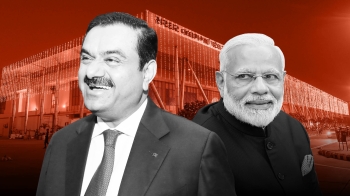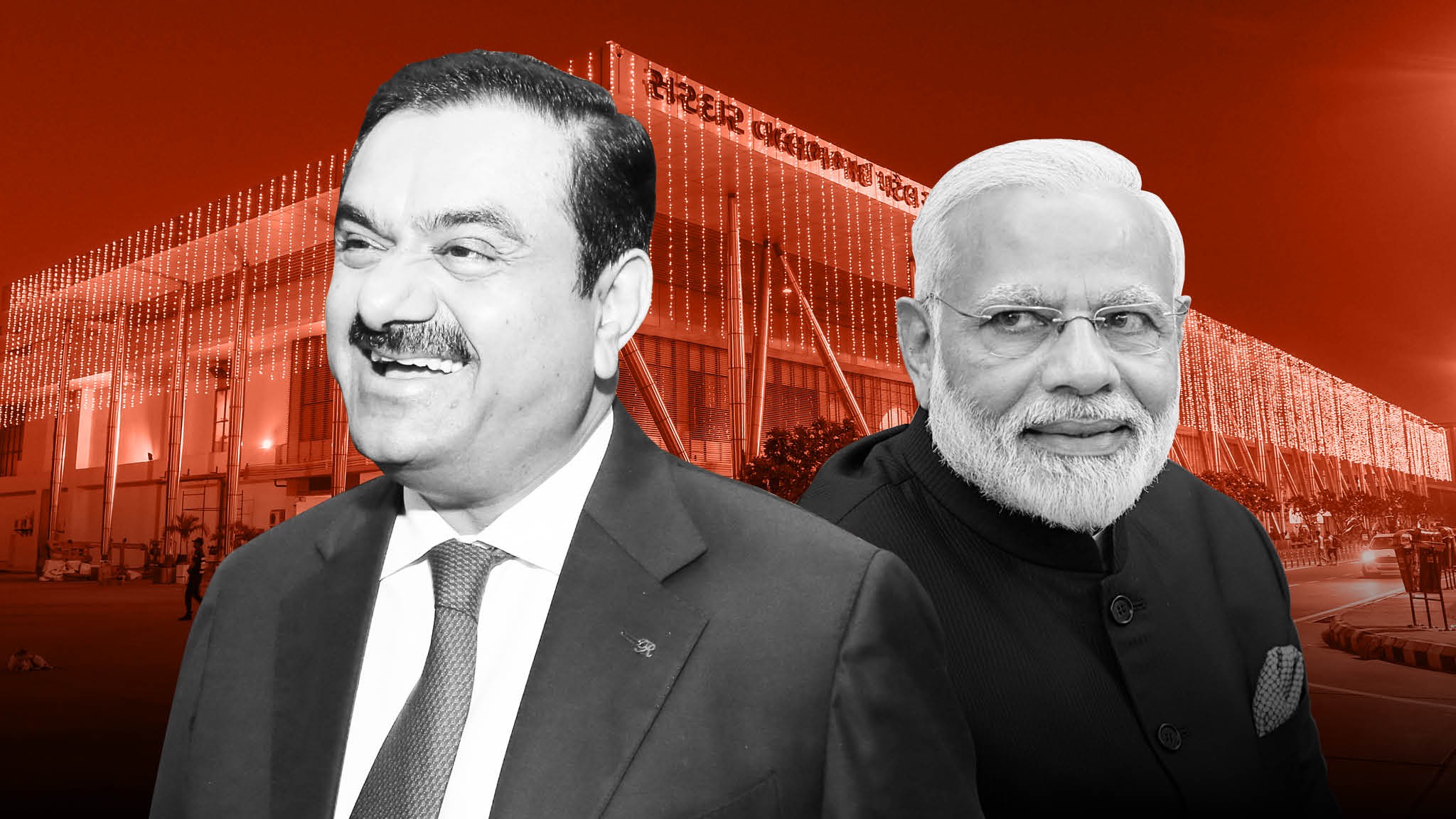
.jpg) Peter Fernandes
Peter Fernandes

Humans by nature are political beings, and politics exists for the common good. Truth and justice ought to be weighed objectively to be the guiding forces in politics to promote the common good. For this reason, the elected representatives are entrusted with the common will. Humans desire to live in a society with peace flowing from truth and justice for the good and wellbeing of all people. Any shortfall is amiss and ought to be corrected immediately before it becomes an acceptable tool for the powerful to control the weak in society.
Political ethics lose its force when politicians engage in favouritism, cronyism, and nepotism. It certainly heralds the arrival of ‘Mitr Kaal’-- political clout -- and certainly not an Amrit Kaal. While presenting the fifth budget, Finance Minister Nirmala Sitharaman said that it was the first budget of Amrit Kaal. Amrit Kaal refers to the most auspicious period. Politics in its purest form is wonderful, but politics as it is applied has been tainted since the beginning of time. The three main factors that contribute to the defilement of politics are favouritism, cronyism, and nepotism.
Favouritism has always been a complaint in government service. Cronyism is a more specific form of favouritism, referring to partiality towards friends and associates. As the old saying goes, "It's not what you know, but who you know." Nepotism is an even narrower form of favouritism -- favouring the members of the family. Both nepotism and cronyism are often at work when political parties recruit candidates for public office.
Political clout that emanates from ‘Mitr Kaal’ is not good for politics or for the nation, for it sabotages the objective good and the common good. It was supposed to be "Amrit Kaal," as announced by the Prime Minister on the 75th Independence Day. How did it take this ugly turn into ‘Mitr Kaal’?
The rise and fall of Adani speak volumes of ‘Mitr Kaal’. "Na khaunga na khaane dunga," a favourite election campaign slogan-line that reverberated throughout the nation as a breath of fresh air in response to the anti-corruption movement has become a disenchantment. Who knew that it would just end up as a gloss to sell a brand? The gullible people bought the narrative as if it were coming from a political messiah -- when the whole nation was campaigning against corruption. By betraying the people by not keeping its promises, corruption has taken deeper roots since this government has come into power.
Now, under the so-called ‘Mitr Kaal’, corruption has reached such an unknown height that the whole nation is confused. By ‘misusing’ central agencies, the government has left no stone unturned in undermining institutions and targeting political opponents -- even the top judiciary is not spared. Winning elections by hook or crook is the ultimate mantra of the BJP.
The BJP, after losing elections in different states, formed the government through the backdoor. After failing to win the people's mandate in the Assembly elections, it formed governments in Goa, Karnataka, Madhya Pradesh, Maharashtra, and some of the north-eastern states by ‘managing’ majority. Ironically, many MLAs have found a ‘washing machine’ in the BJP to come clean. Shashi Tharoor said, “I always wondered about the meaning of ‘Na khaunga na Khaane dunga,’ and I guess he was only talking about beef and not corruption.”
‘Mitr Kaal’ is not just a political parody but an economic disaster. The downfall of Adani would not have mattered much if the investments were not from the public sector. India suddenly became the epic centre of an economic earthquake. The rise of Adani was at the behest of the powers-that-be. Many public sector companies were handed over to the Adani Group, like six airports, railways, ports, and roads. Besides, humongous investments were made by LIC and SBI in the Adani Group.
In fact, demonetization was a masterstroke to create an ecosystem for ‘Mitr Kaal’ to grow organically. In good faith, the people stood in line to empty their wallets, but who knew it was only to help fill somebody else’s pockets? After demonetization, the BJP became the wealthiest political party, and Adani successfully invested in Australia’s coal mines and became the third richest man in the world.
In his political campaigns in the lead-up to the 2014 national elections, Narendra Modi had berated the UPA government. "Coal scam has darkened the face of the entire nation," he tweeted on September 13, 2012. He had also abbreviated the AICC for ‘All India Coal Congress.’ Ironically, the Modi government’s decisions enabled the Adani Group, whose business fortune has risen in parallel with Modi’s political heft, to continue to mine coal, unfettered by the court ruling as well as the government’s own policy decisions that put many other private players at a disadvantage. To date, the company has mined more than 80 million metric tons of coal from the block.
Interestingly, India had signed "The Paris Agreement on Climate Change" to reduce carbon emissions. India had also confirmed pledges to generate 50% of its electricity from non-fossil fuel sources by 2030 and its target for maintaining forest cover, which acts as a carbon sink. However, India is sending mixed signals, as it is rapidly expanding its renewable capacity while at the same time increasing coal consumption.
The ‘Mitr Kaal’ is placing an enormous strain on ecology and the environment as coal is transported through sensitive areas by building additional railways and roads. Concerned citizens are raising their voices, but no one is listening. The ominous signs of ecological and environmental disasters are there for all to see.
"Sabka Saath Sabka Vikas" was supposed to usher in a friendlier era for everyone. But what has happened? When political clout, the ‘Mitr Kaal’, becomes prevalent with favouritism, cronyism, and nepotism, it undermines objectivity and the common good. Where favouritism, cronyism, and nepotism thrive, the risks of dominating unregulated and opaque action and lobbying become problematic areas in regard to and as opposed to transparent and just public policy-making. It’s not sabka vikas but sabka vinash. Government becomes ineffective as a result of a lack of quality and objectivity.
The appearance of favouritism weakens the morale in government service, not to mention public faith in the integrity of the government. When it comes to favouritism shown by government officials to influential corporations, India's ranking had improved sharply in the year 2014, going from 94th to 49th place on a global list. According to an annual World Economic Forum (WEF) study, India has also improved significantly in terms of public trust in politicians, diversion of public funds, and 'irregular payments and bribery' at government institutions.
The Congress president, Mallikarjun Kharge, summed up the Mitra Kaal quagmire by alleging that the "suit boot Sarkar" has written off loans worth Rs. 10 lakh crores by gifting waivers to "friends" on a platter. The Hindenburg Research firm, by showing the courage and audacity to expose the Adani Group, also exposed the cronyism of the present dispensation. By gathering evidence of all the funding operations and offshore activities of the 578 subsidiaries and shell companies linked to the Adani group's seven publicly traded companies, the stock market collapsed like a pack of cards for all to see. ‘Amrit Kaal’ refers to a pivotal moment when the gates of pleasure are made accessible for human beings, angels, and monsters. ‘Mitr Kaal’ creates political clout that decimates the common good -- Mitros.